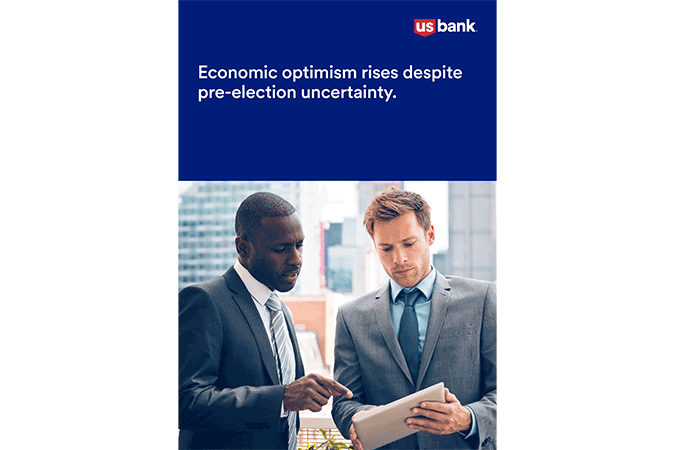The economic outlook is brighter.
In the past six months, chief financial officers and senior finance executives at U.S. businesses have become increasingly bullish about the prospects for the economy:
- 42% say their outlook for the U.S. economy in the next 12 months is positive, up from 37% six months ago.
- 63% are positive about the three-year outlook, up from 58% six months ago.
Business optimism rises.
Surveyed finance leaders are also more optimistic about their own businesses’ fortunes:
- 52% are positive about their business’s financial prospects in the next 12 months, up from 45% six months ago.
- 66% are positive about the business’s financial prospects over the next three years, up from 61% six months ago.
When was this data collected?
The survey data discussed in this article was collected between July 17 and August 8, 2024.
The vast majority (90%) of senior finance leaders were surveyed after July 21, when it was clear that Kamala Harris would replace Joe Biden as the Democratic Party’s presidential nominee.
Interest in hedging grows.
Despite the rosier outlook, the survey data reveals a growing interest in risk mitigation measures ahead of the election:
- 62% say the election has increased their planning for potential corporate tax changes.
- 60% say their appetite for FX and interest rate hedging has increased, while just 15% say it has decreased.
Appetite for major capex, debt issuance drops.
Uncertainty about the election outcome has paused major transactions. About four in 10 respondents say their appetite for major capex projects, debt issuances and major financings has decreased.
This is likely to reflect uncertainty around candidates’ policies, including tariffs, corporate taxes and other areas of the economy. That said, 34% said the election has increased their appetite for M&A, while 30% say it has decreased.
Cost-cutting continues to be finance leaders’ top priority.
Finance leaders’ top two priorities remain the same as when the survey was originally conducted:
- 42% say cutting costs and driving efficiencies within the finance function are top priority, down marginally from 44% six months ago.
- 33% say cost-cutting in the wider businesses ranks second, down slightly from 37% six months ago.
Reflecting the better economic outlook, more finance leaders are prioritizing certain growth and transformation initiatives:
- 25% say contributing to business-wide digital transformation is a top-three priority, up from 19% six months ago.
- 24% say evaluating M&A, divestiture and partnership opportunities is a top-three priority, compared with 20% six months ago.
Top risks cited by survey respondents
Although the proportion of respondents saying they face a high degree of business risk has remained stable at 23% (it was 24% six months ago), the importance of individual risks has changed significantly.
cited technology change as a top risk.
cited possible talent shortages as a top risk.
cited geopolitical tension and war as a top risk.
Strikingly, 32% of respondents flag geopolitical tension and war as a top-three risk, up from 26% six months ago and 17% in 2023. Finance leaders say it is now the third most important business risk; just 12 months ago it was the least important.
Regulatory change has also risen up the agenda: 29% say this is a top-three risk, compared with 22% six months ago.
Just as they have for the past three years, the pace of technology change (39%) and talent shortages (38%) are the top two risks.
Other risks are seen as less important. Just 19%, for instance, now say that high inflation is a top-three risk, down from 25% six months ago and 38% in 2023, and only 16% say that supply chain disruption is a top-three risk – which would have seemed unthinkable only two years ago. Finance leaders now see supply chain disruption as the least important threat.

See the full results of the pulse survey.
Six months after our original CFO Insights research, we conducted a pulse survey of 1,000 finance leaders to gauge their sentiments ahead of the 2024 election. The results show a slowdown in major deals and a continuing focus on cost control, among other takeaways.
Read the complete survey results to gain insight into finance leaders’ current thinking.







